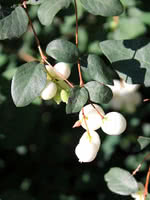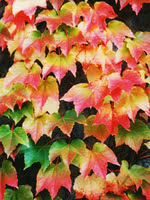Mon-Fri 9am - 5pm Mountain time
Western Snowberry vs Boston Ivy
Symphoricarpos occidentalis
Parthenocissus tricuspidata
NOT AVAILABLE THIS SEASON - MIGHT RETURN
NOT AVAILABLE THIS SEASON - MIGHT RETURN
Like the Common Snowberry, the Western Snowberry is a small shrub with pink flowers useful for feeding livestock and preventing erosion. Unlike the common species, however, the Western Snowberry is much more suited to wet conditions, capable of persevering through poor soil drainage and occasional flooding.
After the Snowberry's flowers have bloomed, it produces berries which often last on the plant through winter. These berries are toxic to humans, but livestock and local wildlife love them! Those hoping to attract wildlife to their property can plant Snowberry and expect to see animals foraging on it much later in the year than other plants.
Boston Ivy is an elegant, climbing vine that is often seen as a decorative addition to the sides of buildings. Unlike other climbing vines, this vine does not need a support to grow on. Instead, it clings to surfaces with holdfasts located at the tendril ends.
Boston Ivy is excellent for covering walls, trellises, arbors or fences, but can also be grown on the ground. Don't plant this vine against wood walls, shingle walls, gutters, or shutters as the holdfasts can cause damage over time. This variety will grow as tall and wide as the structure it is grown upon, so make sure you plan your site accordingly.
Western Snowberry Quick Facts
Boston Ivy Quick Facts
Toxicity: berries are toxic to humans

